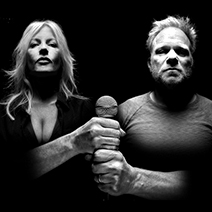Sherie Rene Scott and Norbert Leo Butz
Twohander
Feinstein’s/54 Below, NYC, July 11, 2019
Reviewed by Marilyn Lester for Cabaret Scenes

Norbert Leo Butz
What could be better than a very smart and literate musical script? Well—an eclectic set list that perfectly moves the story along to a glorious conclusion and actors who absolutely scintillate and electrify in their performances. This is precisely the kind of work that pros Sherie Rene Scott and Norbert Leo Butz have created with this somewhat autobiographical play with music. Twohander was conceived by both friends, and written by Scott, who has a handful of stage work under her belt—most notably, Everyday Rapture (written with Dick Scanlan who has directed this outing with an equal measure of virtuosity). From the opening “Save It for Later” (English Beat) to the closing “Freedom ’90” (George Michael), the mostly hard-driving, modern-day song as well as other, more familiar material, reflected Butz’s flexible tenor and mastery at phrasing, along with his focused intensity and passion. Scott’s crystal clear, determined soprano and cooler, but no less committed performance style, were also well served.
Twohander might well be entitled The Last 23 Years, a play on the roles the duo originated in The Last Five Years (“If I Didn’t Believe in You” and “The Next Ten Minutes”). Scott and Butz first met, however, when both were in Rent (“La Vie Boheme” and “One Song Glory”). They went on to establish a close working and personal relationship, including work-shopping an early version of Next to Normal (the cut “I’m Losing You”) and originating roles in Dirty Rotten Scoundrels (“Nothing Is Too Wonderful to Be True”). Through it all, the pair’s relationship on and offstage was one of powerful closeness. It’s a dynamic relevant to the modern era of #MeToo, and the universal theme that both wanted to explore and showcase in this work. It so happened that along the way the relationship broke apart for a decade. But then came repair and healing (“How Lucky Can You Get” from Funny Lady)—the force that’s the bedrock of Twohander, and the message the pair wished most to convey.
The choice of material outside the usual cabaret sphere, such as the aching “Poison and Wine” (The Civil Wars), “Dreamer” (Supertramp), and “Leather and Lace” (Stevie Nicks), is a clear indication that contemporary numbers, especially within the mini-musical format, are a solid pathway to maintaining cabaret’s relevance in the 21st century. The quality and professionalism of Twohander also demonstrates that there is a definite place for theatrical work on the stages of small and intimate rooms such as Feinstein’s/54 Below. Kudos also go to the fantastic band of three multi-instrumentalists and sometime back-up vocalists performing with music director Todd Almond. This tight group added a bright, crisp sound to Almond’s superb arrangements, which supported (and never overpowered) Scott and Butz.





